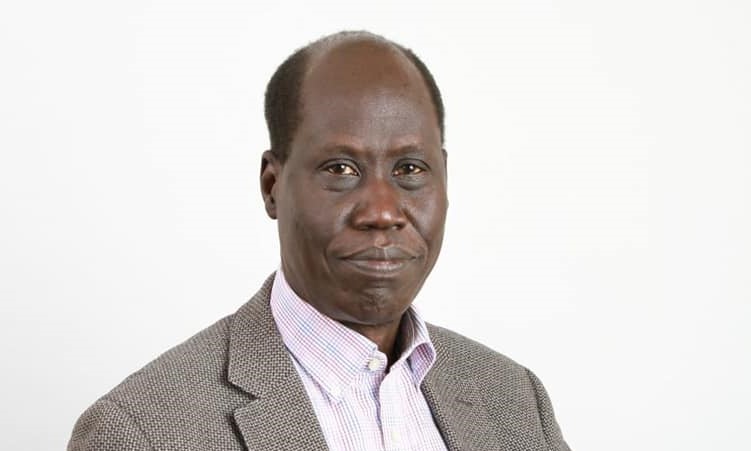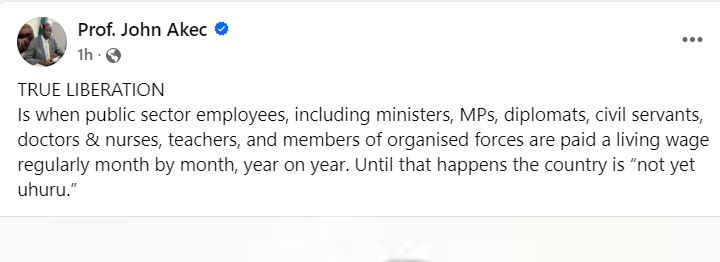
Prof. John Akec, the Vice-Chancellor of the University of Juba - Courtesy
The Vice Chancellor of the University of Juba criticized the delays in salary payment, adding that true liberation is when government workers in the country are regularly remunerated for their work.
Civil servants and members of the organized force in South Sudan have now gone for six months without receiving their salaries, a situation that prompted reactions from activists, lawmakers and foreign envoys.
“True Liberation is when public sector employees, including ministers, MPs, diplomats, civil servants, doctors & nurses, teachers, and members of organized forces are paid a living wage regularly month by month, year on year,” Akec said in a Facebook post.
The vice chancellor added: “Until that happens the country is “not yet uhuru.”
 Recently, civil society activist, Edmund Yakani, called on the government to immediately release the months of salary arears for civil servants and organized forces, who have worked for free since August 2023.
Recently, civil society activist, Edmund Yakani, called on the government to immediately release the months of salary arears for civil servants and organized forces, who have worked for free since August 2023.Yakani, Executive Director of Community Empowerment for Progress Organization (CEPO), demanded an urgent intervention from the national cabinet meeting which took place on February 9, 2024, but the meeting failed to raise the issue.
The activist made the call following concerns raised by civil servants, including a member of parliament, who said even the legislators haven’t received their wages since August 2023.
Clement Juma, the Chairperson of South Sudan National Movement for Change, a signatory to the revitalized peace agreement said the Ministry of Finance failed to pay them their dues under unclear reasons.
First Deputy Speaker of the National Parliament on December 4, 2023, questioned why civil servants are not being paid their salaries, arguing that the country receives “sufficient” oil and non-oil revenues.
Oyet Nathaniel said although there are some difficulties in the economy, it is not a justification to deprive civil servants of their payment.
According to him, salary is an unnegotiable right of every working citizen and must therefore be paid as outlined in the fiscal year budget 2023-2024.
The US Ambassador to South Sudan also reiterated calls on the transitional government to adopt transparent use of oil revenue for the benefit of its citizens.
Michael J. Adler said the country has enough resources while adding that it is unacceptable for the transitional government to allow civil servants to go for months without salaries.
In January 2024, Global Finance ranked resource-rich South Sudan as the poorest country in the world with 476 USD in GDP per capita – a situation blamed on civil wars, ethnic and sectarian strife.
The report said South Sudan, endowed with oil and vast mineral reserves, is a textbook example of the “resource curse,” whereby abundance fosters political and social divisions, inequality, corruption and warfare.
Support Eye Radio, the first independent radio broadcaster of news, information & entertainment in South Sudan.
Make a monthly or a one off contribution.
Copyright 2024. All rights reserved. Eye Radio is a product of Eye Media Limited.